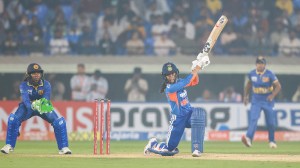During his recent visit to Chhattisgarh’s Dantewada, Union Home Minister Amit Shah had a message for Maoists. Addressing them as “brothers” and requesting them to drop their weapons, Shah reiterated that the government had a March 2026 deadline to end Left Wing Extremism in the country. “You people are one of us. Whenever a Naxal is killed, no one feels happy,” Shah said.
His statement came days after a letter purportedly from the outlawed Communist Party of India (Maoist) offered a ceasefire under certain terms and conditions. The letter, released on April 2, was in the name of Abhay, the nom de guerre of the rebel party’s Politburo member Mallojula Venugopal Rao, 69. The letter claimed that peace talks had been held by a committee in Hyderabad last month, and that the Maoists would immediately call for a “ceasefire” and initiate peace talks if the security forces stopped setting up police camps and running anti-Naxal operations across Chhattisgarh, Maharashtra’s Gadchiroli, Odisha, Jharkhand, Madhya Pradesh, and Telangana.

However, police officials believe it is a tactic by the rebels to buy some time to regroup. “As per the desire of the native population and intention of both state and Union governments, we executed a comprehensive action plan to bring an end to the Naxal menace,” says Inspector General of Police for Bastar Range Sundarraj P. “The results are remarkable and now we are in a dominant position. Assuming the press note by Naxals is authentic, it prima facie appears to be a time-buying tactic that they (Maoists) have used in the past too. They might be trying to get some breathing space. If they are serious, they should surrender their weapon,” Sundarraj says, adding that it was the prerogative of the government to take a final decision regarding peace talks.
Former Chhattisgarh DGP and Naxal expert R K Vij told The Indian Express it was the second time Maoists had offered a ceasefire, and that the peace talks would fail again unless the Maoists ended their armed struggle.
“First, it is not clear if the offer is authentic… Before this, they have talked many times about a ceasefire, laying down conditions, but only when offers were made to them from the government’s side. They offered a ceasefire for the first time in 2002, back when Chandrababu Naidu’s government was in power in undivided Andhra Pradesh. But the peace talks did not happen as Naidu wanted a permanent solution and the Maoists were not ready to give up their armed struggle,” Vij said.
Other dialogue attempts that failed
In 2004, the Congress government of Y S Rajasekhara Reddy in Andhra Pradesh held peace talks for a few days with the Maoists, but nothing came of it as the latter Maoists did not agree to a clause about not carrying weapons during the duration of the dialogue process.
In May 2010, then Union Home Minister P Chidambaram wrote to human rights activist Swami Agnivesh asking him to act as a mediator. However, the talks failed that July after CPI(Maoist) Central Committee member Azad, who was supposed to lead the dialogue for the rebel side, was killed in an encounter.
Story continues below this ad
The Congress, in its 2018 Assembly election manifesto, mentioned it would pursue peace talks, but it did not happen after the party came to power. In 2022, state Home Minister Tamradhwaj Sahu, responding to a letter from the Maoists, said the talks would be held only if there were no conditions. Back then, the Maoists had made several demands, including lifting the ban on the CPI (Maoist) and its frontal organisations, stopping alleged aerial strikes, the withdrawal of forces from conflict zones, and the release of their jailed leaders.
“Peace talks are not part of their ideology, which is capturing power through an armed struggle,” says Vij. “Peace talks mean their agenda of armed struggle is defeated… We should go for peace talks once they lay down their arms and go for a long-term solution… If they are not giving up their weapons and ammunition, it simply means they will use this period to regroup… They want the talks only when it is of some advantage to them.”
Vij, a former additional director general for Naxal operations, adds that the government had done “effective work” through encounters and setting up police camps to fill the security vacuum.
Some civil society members feel it is too late for the Maoists to pursue peace. Shubranshu Choudhary, a peace activist in Bastar, says, “The only new thing in the latest letter was that a peace dialogue committee met in Hyderabad… This is the third letter Maoists have written asking for peace talks after state Home Minister Vijay Sharma last year said he was ready to speak with Maoists … It seems now it was Sharma’s personal response and not the official stand of his party or the government. The Central government’s only route is the military route.”
Story continues below this ad
Since the BJP returned to power in Chhattisgarh in December 2023, more than 350 Maoists have been killed in various operations. Of these rebels, 135 have been gunned down this year.
Following the letter from the Maoists, Sharma said last week, “They are talking about a ceasefire. I don’t understand how the discussion will take place with such terminology. I want to say again that neither the Central nor the state government wants to fire a single bullet.”

































